牛津上海版英语九年级上册课件:Unit 1 Ancient Greece Reading(共58张PPT)
文档属性
| 名称 | 牛津上海版英语九年级上册课件:Unit 1 Ancient Greece Reading(共58张PPT) |

|
|
| 格式 | zip | ||
| 文件大小 | 68.7MB | ||
| 资源类型 | 教案 | ||
| 版本资源 | 牛津上海版(试用本) | ||
| 科目 | 英语 | ||
| 更新时间 | 2016-06-20 00:00:00 | ||
图片预览

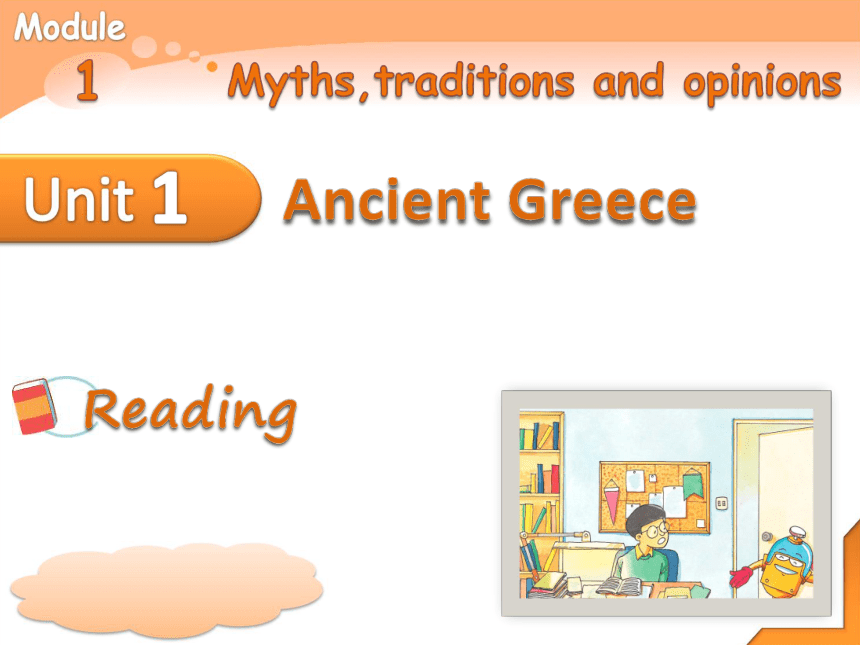

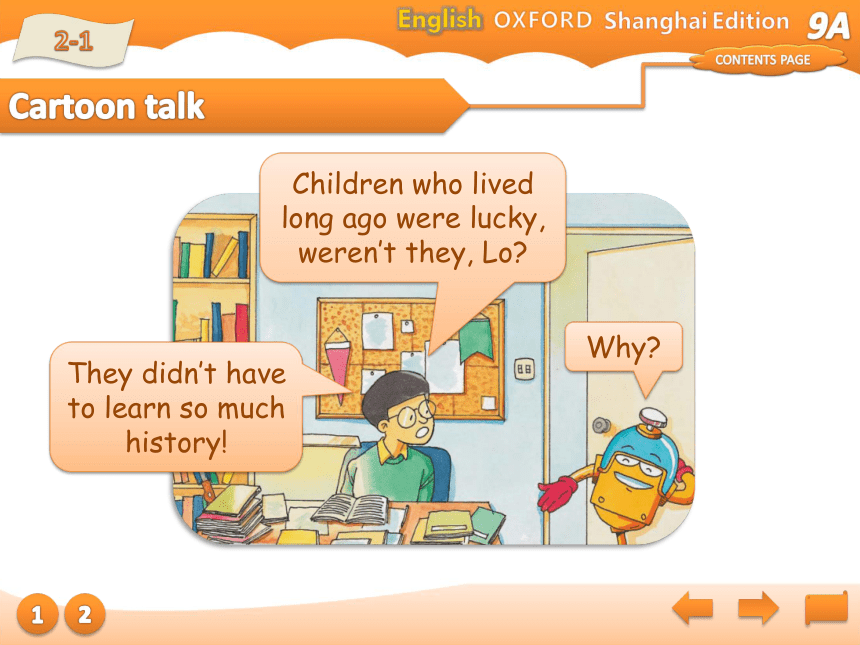
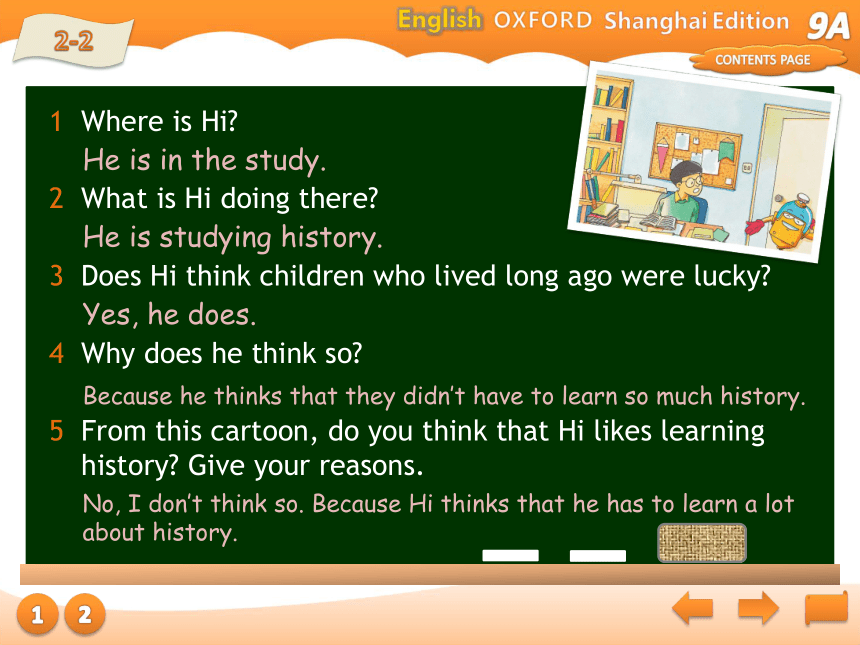
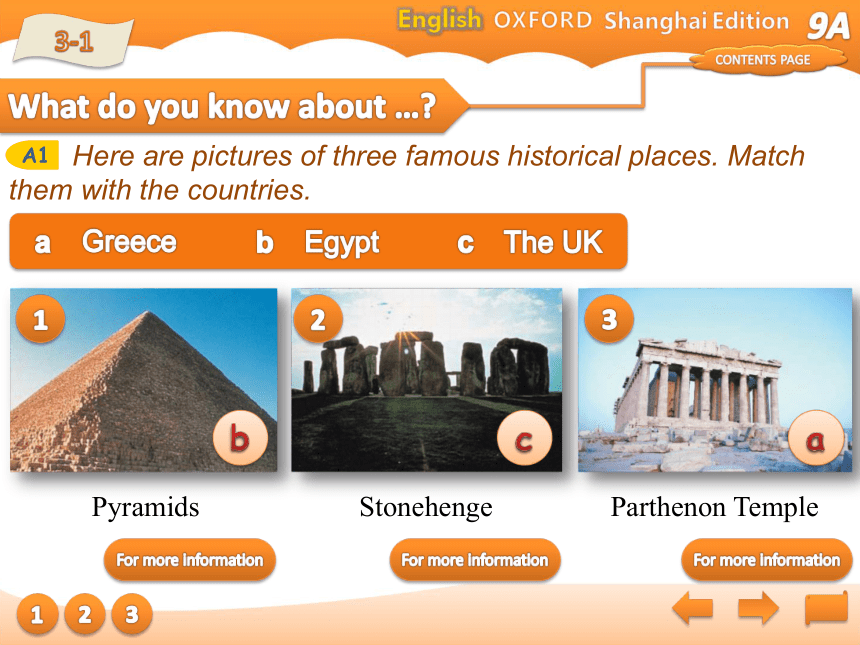

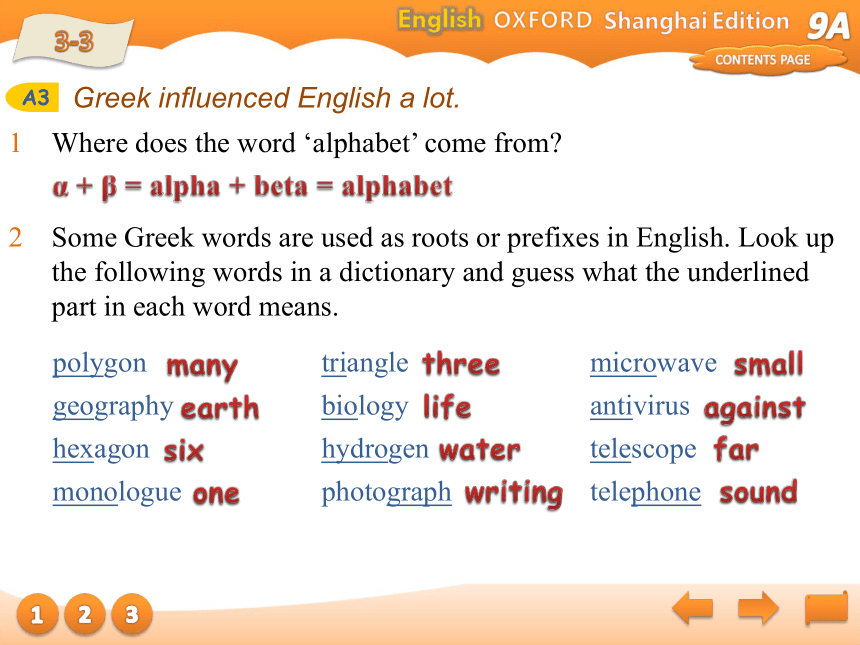
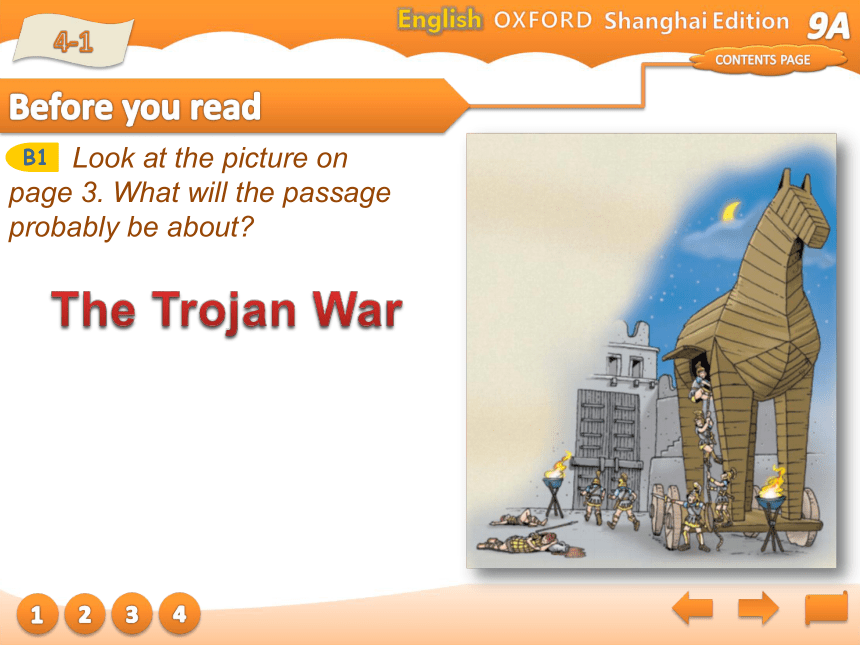


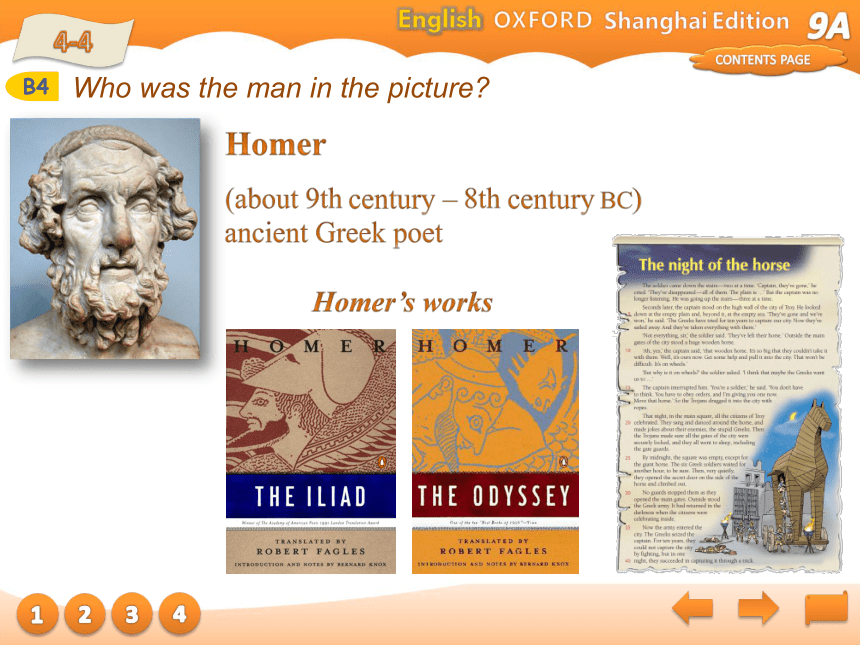
文档简介
课件58张PPT。1Myths,traditions and opinions1Ancient GreeceReadingCONTENTS PAGECartoon talkWhat do you know about …?Before you readWhile you readVocabularyComprehensionAfter you readCartoon talk2-112Children who lived long ago were lucky, weren’t they, Lo?Why?They didn’t have to learn so much history!Where is Hi?
What is Hi doing there?
Does Hi think children who lived long ago were lucky?
Why does he think so?
From this cartoon, do you think that Hi likes learning history? Give your reasons. He is in the study.He is studying history.Yes, he does.Because he thinks that they didn’t have to learn so much history.No, I don’t think so. Because Hi thinks that he has to learn a lot about history.2-212What do you know about …?3-1123 Here are pictures of three famous historical places. Match them with the countries.A1a Greece b Egypt c The UKbcaFor more informationFor more informationFor more information Can you read these letters?A23-2123Α α
Β β
Γ γ
Δ δalphabetagammadeltaThese are the first four letters of the Greek alphabet.3-3123 Greek influenced English a lot.A3Where does the word ‘alphabet’ come from?α + β = alpha + beta = alphabetSome Greek words are used as roots or prefixes in English. Look up the following words in a dictionary and guess what the underlined part in each word means.manythreesmallearthlifeagainstsixwaterfaronewritingsoundBefore you read4-11234 Look at the picture on page 3. What will the passage probably be about?B1The Trojan War These pictures show some of the events in the story on page 3. Use your imagination to arrange them in the correct order.B24-21234abcdef4-31234 Now read through the story on page 3 quickly to check if you have put the pictures in the correct order.B3abcdef416325 Who was the man in the picture?B44-41234Homer(about 9th century – 8th century BC)
ancient Greek poetHomer’s worksWhile you read4-11234The soldier came down the stairs—two at a time. ‘Captain, they’ve gone,’ he cried. ‘They’ve disappeared —all of them. The plain is …’ But the captain was no longer listening. He was going up the stairs —three at a time.
Seconds later, the captain stood on the high wall of the city of Troy. He looked down at the empty plain and, beyond it, at the empty sea. ‘They’ve gone and we’ve won,’ he said. ‘The Greeks have tried for ten years to capture our city. Now they’ve sailed away. And they’ve taken everything with them.’The night of the horse4-21234‘Not everything, sir,’ the soldier said. ‘They’ve left their horse.’ Outside the main gates of the city stood a huge wooden horse.
‘Ah, yes,’ the captain said, ‘that wooden horse. It’s so big that they couldn’t take it with them. Well, it’s ours now. Get some help and pull it into the city. That won’t be difficult. It’s on wheels.’
‘But why is it on wheels?’ the soldier asked. ‘I think that maybe the Greeks want us to …’
The captain interrupted him. ‘You’re a soldier,’ he said. ‘You don’t have to think. You have to obey orders, and I’m giving you one now. Move that horse.’ So the Trojans dragged it into the city with ropes.4-31234That night, in the main square, all the citizens of Troy celebrated. They sang and danced around the horse, and made jokes about their enemies, the stupid Greeks. Then the Trojans made sure all the gates of the city were securely locked, and they all went to sleep, including the gate guards.By midnight, the square was empty, except for the giant horse. The six Greek soldiers waited for another hour, to be sure. Then, very quietly, they opened the secret door on the side of the horse and climbed out.4-41234No guards stopped them as they opened the main gates. Outside stood the Greek army. It had returned in the darkness when the citizens were celebrating inside.Now the army entered the city. The Greeks seized the captain. For ten years, they could not capture the city
by fighting, but in one night, they succeeded in capturing it through a trick.Vocabulary4-112 Find these words and phrases in the story. Then read the words around them and choose the best meanings.C11 at a time 2 disappeared 3 main
4 enemies 5 securely 6 army
7 entered 8 succeeded in344-21234 Find the words in Column A in the story and match them with the meanings in Column B.C24-312acfebdg34 Complete the following sentences with the words or phrases from C1 and C2. Change the forms when necessary.C34-412How is your family going to ____________ Christmas?
I remember the ____________ points of the story, but I have forgotten the details.
All the chocolate has ____________, but it was on the table five minutes ago.
The removal men ____________ the boxes away.
Did you tie the parcel up ____________?
The army ____________ more than 50 enemy soldiers in the battle.
My aunt lives in a small village ____________ this mountain.
He joined the ____________ at the age of 18.
To ____________ the contest is not very easy.
The man ____________ the thief and took him to the police station.celebratemaindisappeareddraggedsecurelycapturedbeyondarmysucceed inseized34The soldier was probably feeling ______ when he came down the stairs. a frightened b excited c angry
The Greek army disappeared because they were ______ the Trojans. a beaten by b playing a trick on c frightened by
According to the captain, the Greeks left the horse behind because ______. a it was too big to fit in the Greek ships b they did not want it any more c it contained some Greek soldiersComprehension6-11234 Choose the best answers to complete these sentences.D156What do you think the soldier was going to say when the captain interrupted him? He was probably going to say ‘I think that maybe the Greeks want us to ______.’ a return the horse to them b take the horse into the city c push the horse into the sea
The six Greek soldiers waited for another hour because they wanted to be sure that ______. a the Greek army had opened the gates b all of the Trojans were asleep c the Greek army had entered the city
The Greeks had not been able to defeat the Trojans for ten years because ______. a the Greeks could not get inside the gates of Troy b the Trojans had a wooden horse c the Trojans had lots more soldiers6-2123456 What do the words in italics refer to in the story? Write short answers. The first one has been done for you.D26-31 They’ve left their horse. The Greeks
2 … pull it into the city.
3 … they all went to sleep …
4 No guards stopped them …
5 … they succeeded in capturing it …the wooden horsethe Trojansthe six Greek soldiersthe city of Troy123456 Complete the following table about the Trojan War.D36-4sailed awaymade of wood on wheelslooked down atplainemptywonobey ordersdraggedintoropes1234566-5returneddarknesscelebratedmade jokes aboutmade suresecurely lockedincluding the gate guards sixsquare1234566-6secret doorclimbed outmain gatesenteredseizedstoppedcaptured123456After you read3-1123 Answer the following questions.E1Why did the soldier come down the stairs two at a time?
What did the captain do then?
What did he see when he stood on the high wall of the city of Troy?
How long had the Greeks tried to capture the city of Troy?
Did the Greeks take everything with them?
Why did the captain think the Greeks hadn’t taken away the wooden horse?
What did the captain ask the solider to do then?Was it difficult for the Trojans to take the huge wooden horse into the city? Why or why not?
What did the solider want to say when the captain interrupted him?
How did the Trojans move the horse into the city?
What did the Trojans do at night?
What did they do after the celebration?
What happened after the square was completely empty?
They were caught by the Trojans, weren’t they?
What did they do then?
Who were waiting outside the main gates of the city?
What did they do to the city of Troy?3-2123 Work in groups. Think about these questions and discuss with your group members.E23-3123ConsolidationWorkbook 9A, pages 1 and 9.
说 明
本册教材根据上海市中小学(幼儿园)课程改革委员会制订的课程方案和《上海市中小学英语课程标准(征求意见稿)》编写,供九年义务教育九年级第一学期试用。
本教材经上海市中小学教材审查委员会审查准予试用。
《英语(牛津上海版)》(试用本)
主 编:沃振华
原 作 者:P Etherton G McArthur P Leetch
改编人员:沃振华 朱维庭 李绍贤 施安吉 施志红
奚翠华 卢 璐 张 瑶
牛津大学出版社(中国)有限公司英语教材编写委员会
责任编辑:马芳芳 林 妍
插 图:K Y Chan 周允达
课件制作:卢 璐
支持学校:上海市市北初级中学The pyramids were built as tombs for the ancient pharaohs (/'fe?r??z/) of Egypt. The mummified bodies of the dead pharaohs, surrounded by goods and treasures, were hidden somewhere in the centre of the pyramids. The most famous is the Great Pyramid of Giza (/'ɡi:z?/), just outside Cairo. It dates from about 2,600 BC and is made from 2,300,000 massive, but exactly cut, blocks of stone. It is considered one of the New Seven Wonders of the World.BACKStonehenge (/'st??nhen?/) is a strange circle of giant stones in the south of England. Built around 1,800–1,400 BC, it seems to have had religious significance, and some experts believe that it was used for funeral ceremonies. However, no one knows for certain. The stones are arranged so that the Sun and the moon rise over certain stones on particular days of the year, such as the summer solstice. By observing the Sun, the moon and the stars as they passed over the stones, the ancient people were able to keep a calendar for their religious ceremonies.BACKThe Parthenon (/'pɑ:θ?n?n/) Temple was built in the fifth century BC in Athens, Greece. It was built in honour of the goddess Athena (/?'θi:n?/). The city’s name also comes from the goddess’ name. The Parthenon is one of the oldest and finest examples of the ancient Greeks’ great building skills. Even though it has been badly damaged and many things have been stolen from it, the Parthenon is still spectacular. It can be seen from most parts of Athens.BACKstair/ste?(r)/ n.steps that lead up and down inside a building (usu. pl.)I ran up the stairs to the bedroom.at a timeeach time; on each occasionShe ran up the stairs two at a time.plain/ple?n/ n.a large piece of flat landI travelled across the Great Plains when I was in the USA.no longernot … any longer; not … any moreThe Smiths no longer live here.Troy/tr??/ n.The city of Troy is now in Turkey.beyond/b?'j?nd/ prep.past; on the far side ofIt is not allowed to go beyond that line before the game starts.Greek/ɡri:k/ n.a person from modern or ancient GreeceAncient Greeks were often great thinkers.capture/'k?p??(r)/ v.take control of a place, building, etc. using forceThe city was captured in 1941.wheel/wi:l/ n.one of the circular objects under a car, bicycle, bus, etc. that turns when it movesOne of the boys was pushing the other along in a little box on wheels.Trojan/'tr????n/ n.a person from the ancient city of Troy in Asia MinorOnce, the Trojans fought with the Greeks for ten years.drag/dr?ɡ/ v.pull something along with difficultyThe young girl dragged the heavy bag into the classroom.citizen/'s?t?zn/ n.a person who lives in a certain placeIt is the duty of every citizen to keep the environment clean.joke/???k/ n.something that you say or do to make people laugh, for example, a funny story that you tellI thought it as a joke.enemy/'en?m?/ n.a person who hates somebody or who acts or speaks against somebody/somethingBirds are the natural enemies of many insect pests.securely/s?'kj??l?/ adv.safelyMake sure your room is securely locked.go to sleepfall asleepShe was so tired and went to sleep immediately after she got into bed.including/?n'klu:d??/ prep.counting as one of a groupThere were twelve people at the party, including myself.midnight/'m?dna?t/ n.12 o’clock at nightThey had to leave at midnight.except fornot includingThe dinner was perfect except for the service of the restaurant.army/'ɑ:m?/ n.a large group of soldiersThe country has millions of soldiers in its army.darkness/'dɑ:kn?s/ n.where there is no lightThe whole house was in darkness.seize/si:z/ v.take hold of something suddenly and with forceThe police seized the thief at last.succeed/s?k'si:d/ v.achievePeople have succeeded in putting astronauts on the moon.fit/f?t/ v.be the right shape and size for somebody/somethingI tried the dress on but it didn’t fit.
What is Hi doing there?
Does Hi think children who lived long ago were lucky?
Why does he think so?
From this cartoon, do you think that Hi likes learning history? Give your reasons. He is in the study.He is studying history.Yes, he does.Because he thinks that they didn’t have to learn so much history.No, I don’t think so. Because Hi thinks that he has to learn a lot about history.2-212What do you know about …?3-1123 Here are pictures of three famous historical places. Match them with the countries.A1a Greece b Egypt c The UKbcaFor more informationFor more informationFor more information Can you read these letters?A23-2123Α α
Β β
Γ γ
Δ δalphabetagammadeltaThese are the first four letters of the Greek alphabet.3-3123 Greek influenced English a lot.A3Where does the word ‘alphabet’ come from?α + β = alpha + beta = alphabetSome Greek words are used as roots or prefixes in English. Look up the following words in a dictionary and guess what the underlined part in each word means.manythreesmallearthlifeagainstsixwaterfaronewritingsoundBefore you read4-11234 Look at the picture on page 3. What will the passage probably be about?B1The Trojan War These pictures show some of the events in the story on page 3. Use your imagination to arrange them in the correct order.B24-21234abcdef4-31234 Now read through the story on page 3 quickly to check if you have put the pictures in the correct order.B3abcdef416325 Who was the man in the picture?B44-41234Homer(about 9th century – 8th century BC)
ancient Greek poetHomer’s worksWhile you read4-11234The soldier came down the stairs—two at a time. ‘Captain, they’ve gone,’ he cried. ‘They’ve disappeared —all of them. The plain is …’ But the captain was no longer listening. He was going up the stairs —three at a time.
Seconds later, the captain stood on the high wall of the city of Troy. He looked down at the empty plain and, beyond it, at the empty sea. ‘They’ve gone and we’ve won,’ he said. ‘The Greeks have tried for ten years to capture our city. Now they’ve sailed away. And they’ve taken everything with them.’The night of the horse4-21234‘Not everything, sir,’ the soldier said. ‘They’ve left their horse.’ Outside the main gates of the city stood a huge wooden horse.
‘Ah, yes,’ the captain said, ‘that wooden horse. It’s so big that they couldn’t take it with them. Well, it’s ours now. Get some help and pull it into the city. That won’t be difficult. It’s on wheels.’
‘But why is it on wheels?’ the soldier asked. ‘I think that maybe the Greeks want us to …’
The captain interrupted him. ‘You’re a soldier,’ he said. ‘You don’t have to think. You have to obey orders, and I’m giving you one now. Move that horse.’ So the Trojans dragged it into the city with ropes.4-31234That night, in the main square, all the citizens of Troy celebrated. They sang and danced around the horse, and made jokes about their enemies, the stupid Greeks. Then the Trojans made sure all the gates of the city were securely locked, and they all went to sleep, including the gate guards.By midnight, the square was empty, except for the giant horse. The six Greek soldiers waited for another hour, to be sure. Then, very quietly, they opened the secret door on the side of the horse and climbed out.4-41234No guards stopped them as they opened the main gates. Outside stood the Greek army. It had returned in the darkness when the citizens were celebrating inside.Now the army entered the city. The Greeks seized the captain. For ten years, they could not capture the city
by fighting, but in one night, they succeeded in capturing it through a trick.Vocabulary4-112 Find these words and phrases in the story. Then read the words around them and choose the best meanings.C11 at a time 2 disappeared 3 main
4 enemies 5 securely 6 army
7 entered 8 succeeded in344-21234 Find the words in Column A in the story and match them with the meanings in Column B.C24-312acfebdg34 Complete the following sentences with the words or phrases from C1 and C2. Change the forms when necessary.C34-412How is your family going to ____________ Christmas?
I remember the ____________ points of the story, but I have forgotten the details.
All the chocolate has ____________, but it was on the table five minutes ago.
The removal men ____________ the boxes away.
Did you tie the parcel up ____________?
The army ____________ more than 50 enemy soldiers in the battle.
My aunt lives in a small village ____________ this mountain.
He joined the ____________ at the age of 18.
To ____________ the contest is not very easy.
The man ____________ the thief and took him to the police station.celebratemaindisappeareddraggedsecurelycapturedbeyondarmysucceed inseized34The soldier was probably feeling ______ when he came down the stairs. a frightened b excited c angry
The Greek army disappeared because they were ______ the Trojans. a beaten by b playing a trick on c frightened by
According to the captain, the Greeks left the horse behind because ______. a it was too big to fit in the Greek ships b they did not want it any more c it contained some Greek soldiersComprehension6-11234 Choose the best answers to complete these sentences.D156What do you think the soldier was going to say when the captain interrupted him? He was probably going to say ‘I think that maybe the Greeks want us to ______.’ a return the horse to them b take the horse into the city c push the horse into the sea
The six Greek soldiers waited for another hour because they wanted to be sure that ______. a the Greek army had opened the gates b all of the Trojans were asleep c the Greek army had entered the city
The Greeks had not been able to defeat the Trojans for ten years because ______. a the Greeks could not get inside the gates of Troy b the Trojans had a wooden horse c the Trojans had lots more soldiers6-2123456 What do the words in italics refer to in the story? Write short answers. The first one has been done for you.D26-31 They’ve left their horse. The Greeks
2 … pull it into the city.
3 … they all went to sleep …
4 No guards stopped them …
5 … they succeeded in capturing it …the wooden horsethe Trojansthe six Greek soldiersthe city of Troy123456 Complete the following table about the Trojan War.D36-4sailed awaymade of wood on wheelslooked down atplainemptywonobey ordersdraggedintoropes1234566-5returneddarknesscelebratedmade jokes aboutmade suresecurely lockedincluding the gate guards sixsquare1234566-6secret doorclimbed outmain gatesenteredseizedstoppedcaptured123456After you read3-1123 Answer the following questions.E1Why did the soldier come down the stairs two at a time?
What did the captain do then?
What did he see when he stood on the high wall of the city of Troy?
How long had the Greeks tried to capture the city of Troy?
Did the Greeks take everything with them?
Why did the captain think the Greeks hadn’t taken away the wooden horse?
What did the captain ask the solider to do then?Was it difficult for the Trojans to take the huge wooden horse into the city? Why or why not?
What did the solider want to say when the captain interrupted him?
How did the Trojans move the horse into the city?
What did the Trojans do at night?
What did they do after the celebration?
What happened after the square was completely empty?
They were caught by the Trojans, weren’t they?
What did they do then?
Who were waiting outside the main gates of the city?
What did they do to the city of Troy?3-2123 Work in groups. Think about these questions and discuss with your group members.E23-3123ConsolidationWorkbook 9A, pages 1 and 9.
说 明
本册教材根据上海市中小学(幼儿园)课程改革委员会制订的课程方案和《上海市中小学英语课程标准(征求意见稿)》编写,供九年义务教育九年级第一学期试用。
本教材经上海市中小学教材审查委员会审查准予试用。
《英语(牛津上海版)》(试用本)
主 编:沃振华
原 作 者:P Etherton G McArthur P Leetch
改编人员:沃振华 朱维庭 李绍贤 施安吉 施志红
奚翠华 卢 璐 张 瑶
牛津大学出版社(中国)有限公司英语教材编写委员会
责任编辑:马芳芳 林 妍
插 图:K Y Chan 周允达
课件制作:卢 璐
支持学校:上海市市北初级中学The pyramids were built as tombs for the ancient pharaohs (/'fe?r??z/) of Egypt. The mummified bodies of the dead pharaohs, surrounded by goods and treasures, were hidden somewhere in the centre of the pyramids. The most famous is the Great Pyramid of Giza (/'ɡi:z?/), just outside Cairo. It dates from about 2,600 BC and is made from 2,300,000 massive, but exactly cut, blocks of stone. It is considered one of the New Seven Wonders of the World.BACKStonehenge (/'st??nhen?/) is a strange circle of giant stones in the south of England. Built around 1,800–1,400 BC, it seems to have had religious significance, and some experts believe that it was used for funeral ceremonies. However, no one knows for certain. The stones are arranged so that the Sun and the moon rise over certain stones on particular days of the year, such as the summer solstice. By observing the Sun, the moon and the stars as they passed over the stones, the ancient people were able to keep a calendar for their religious ceremonies.BACKThe Parthenon (/'pɑ:θ?n?n/) Temple was built in the fifth century BC in Athens, Greece. It was built in honour of the goddess Athena (/?'θi:n?/). The city’s name also comes from the goddess’ name. The Parthenon is one of the oldest and finest examples of the ancient Greeks’ great building skills. Even though it has been badly damaged and many things have been stolen from it, the Parthenon is still spectacular. It can be seen from most parts of Athens.BACKstair/ste?(r)/ n.steps that lead up and down inside a building (usu. pl.)I ran up the stairs to the bedroom.at a timeeach time; on each occasionShe ran up the stairs two at a time.plain/ple?n/ n.a large piece of flat landI travelled across the Great Plains when I was in the USA.no longernot … any longer; not … any moreThe Smiths no longer live here.Troy/tr??/ n.The city of Troy is now in Turkey.beyond/b?'j?nd/ prep.past; on the far side ofIt is not allowed to go beyond that line before the game starts.Greek/ɡri:k/ n.a person from modern or ancient GreeceAncient Greeks were often great thinkers.capture/'k?p??(r)/ v.take control of a place, building, etc. using forceThe city was captured in 1941.wheel/wi:l/ n.one of the circular objects under a car, bicycle, bus, etc. that turns when it movesOne of the boys was pushing the other along in a little box on wheels.Trojan/'tr????n/ n.a person from the ancient city of Troy in Asia MinorOnce, the Trojans fought with the Greeks for ten years.drag/dr?ɡ/ v.pull something along with difficultyThe young girl dragged the heavy bag into the classroom.citizen/'s?t?zn/ n.a person who lives in a certain placeIt is the duty of every citizen to keep the environment clean.joke/???k/ n.something that you say or do to make people laugh, for example, a funny story that you tellI thought it as a joke.enemy/'en?m?/ n.a person who hates somebody or who acts or speaks against somebody/somethingBirds are the natural enemies of many insect pests.securely/s?'kj??l?/ adv.safelyMake sure your room is securely locked.go to sleepfall asleepShe was so tired and went to sleep immediately after she got into bed.including/?n'klu:d??/ prep.counting as one of a groupThere were twelve people at the party, including myself.midnight/'m?dna?t/ n.12 o’clock at nightThey had to leave at midnight.except fornot includingThe dinner was perfect except for the service of the restaurant.army/'ɑ:m?/ n.a large group of soldiersThe country has millions of soldiers in its army.darkness/'dɑ:kn?s/ n.where there is no lightThe whole house was in darkness.seize/si:z/ v.take hold of something suddenly and with forceThe police seized the thief at last.succeed/s?k'si:d/ v.achievePeople have succeeded in putting astronauts on the moon.fit/f?t/ v.be the right shape and size for somebody/somethingI tried the dress on but it didn’t fit.
